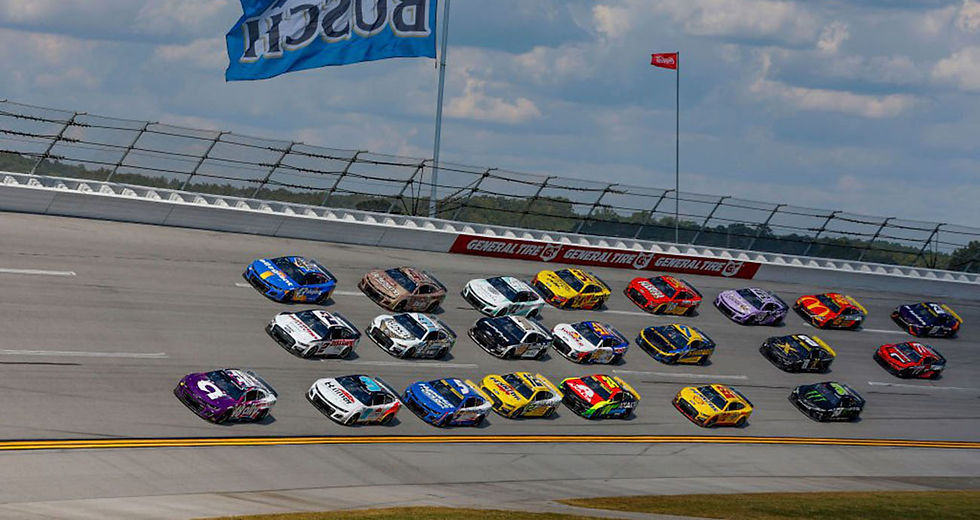NASCAR: What Can be Done to Save America’s Original Motorsport?
- Zachary Bryson
- Jun 22, 2022
- 3 min read
Updated: Jul 19, 2022
There was a time in the United States when televised motorsports and NASCAR were synonymous. Today, NASCAR is lucky if an average non-motorsports fan can recall their name at all. I can only imagine John Middlebrook, National Commissioner of NASCAR is scrambling to find answers to this decline in popularity, especially in light of the reinvigorated challenge brought by INDYCAR and unprecedented growth in interest for Formula One in the U.S.
So—Why is NASCAR withering, while other motorsports seem to be thriving in the same market, and what does Middlebrook do to combat this?
Growing popularity of competing series:
In the past few years, INDYCAR and F1 have experienced a huge resurgence. Rodger Penske and Liberty Media, which own INDYCAR and F1 respectively, have capitalized on high-stakes drama and successful mass-media campaigns to grow their respective sports to new heights. For INDYCAR, average TV viewership is up 13 percent over last year, drawing both F1 and NASCAR fans with drivers Roman Grosjean and Jimmy Johnson joining the series for the 2021 season. F1 boasted an astronomical 54 percent year-over-year growth in U.S. TV viewership for 2021, assisted both by the continued popularity of the Netflix Docuseries Drive to Survive and the announced addition of a destination race in Miami which took place this past May.
Both INDYCAR and F1 as organizations are executing well-planned, targeted campaigns for growth, and unless something major changes will both continue to maintain a trajectory of growth.
NASCAR’s decline:
While INDYCAR and F1 have been building and executing multi-year plans to promote growth, NASCAR has continued to fade into the background. In 2021, NASCAR’s TV viewership set a record for its lowest ratings ever, averaging 2.9 million viewers per event. This was astounding, considering that it was the first year of a full calendar of events since the COVID-19 pandemic. So far for the 2022 season, FOX Sports averaged 4.5 million viewers per race for the 10 races it contracted to cover, a 10% increase over last year—but FOX won’t broadcast any of the 10 remaining races, which will likely temper these numbers, which are still well below peak viewership in 2005 of 9.6 million per race.
What can be done?
NASCAR’s biggest stumbling block is, as of now, built into their very DNA as an organization. When I say Formula One, you picture Monaco— a refined event with celebrities and billionaires milling about, upscale dining experiences, and champaign flowing freely in the paddock. When I say NASCAR, you see none of these things—you picture “rednecks,” country music, Busch Light beer, and fast food. NASCAR loves to tout its southern roots and heritage, and there is nothing wrong with that—but in recent years this image has become less popular nationally, and alienates entire categories of potential fans that, since there are other options, are gravitating elsewhere. As a casual fan of NASCAR, this saddens me, because going to a NASCAR race is a blast and the sport deserves to grow, but its current national persona prevents it from doing so.
Right now, there is an unprecedented interest in vintage NASCAR memorabilia, with celebrities being seen walking the streets of Hollywood sporting a Jeff Gordon or Dale Earnhardt Jr. jacket—which represents a huge opportunity for NASCAR to expand into other markets and change its long-held “good old boy” persona. despite this, NASCAR does not seem to be addressing or doing anything with this tool of newfound vintage/celebrity popularity. Yes, in the past few years NASCAR has made changes to the series to make it more exciting and accessible to fans with the introduction of the playoffs, competition cautions, a dirt race at Bristol, etc., but despite these efforts, viewership is still declined and they have ignored what is, to me, an obvious avenue of increasing national awareness and popularity through these celebrities.
The “Future” of NASCAR?
In my opinion, NASCAR still has a place in American motorsports. It still provides excitement, racing that you can't find anywhere else, and its own brand of drama. But, unless NASCAR is willing and planning to change itself in ways that make it more marketable on a widespread national scale, they're destined to become a faded memory of the past instead of a bright spotlight on a uniquely American sport. Middlebrook has a tough job ahead of him if he wants to see NASCAR survive another 10 years.
Zachary Bryson is a graduate from Wake Forest University with B.A. in Economics and a Minor in Entrepreneurship. He is currently JD candidate at Elon University School of Law, Class of 2023. You can connect with him via LinkedIn or follow him on twitter at @ZacharySBryson.






